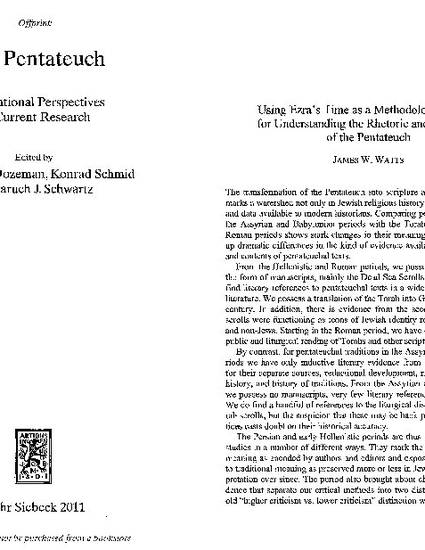
James W. Watts: 0000-0002-4872-4986
- Pentateuch,
- Ezra,
- Hebrew Bible,
- scripturalization,
- canonization,
- iconic books,
- rhetoric
The Persian period saw the transformation of pentateuchal materials into a scripture, the Torah. The story of Ezra exemplifies that transformation by its description of his manipulation of the physical scroll, his oral reading of it before the people of Jerusalem, and his arrangement for its professional translation/interpretation by Levites. These rituals have characterized the function of the Torah (and other scriptures) from that time forward. The Persian period, however, also marks a major change in the nature of our evidence for the form, contents and meaning of pentateuchal materials. The only historical evidence from before the time of Ezra for the Pentateuch’s composition, meaning and use must be derived inductively from literary analyses of biblical texts. From the time of the Ezra story on, our data comes increasingly from explicit references to Torah scrolls in other literature (including the books of Ezra and Nehemiah), translations of the Pentateuch’s text (e.g. the Septuagint) and material evidence such as manuscripts (e.g. Qumran) and ancient synagogue architecture. The transformation of the Pentateuch into scripture around the time of Ezra thus marks a watershed not only in Jewish religious history but also in the methods and data available to modern historians. Pentateuchal studies should develop the capacity to correlate the divergent methods used to study the Pentateuch on both sides of this scriptural divide in order to give a comprehensive account of the Torah’s history and significance. I suggest that rhetorical analysis can provide an overarching methodological umbrella under which to arrange the results of other methods of interpretation coherently.

Proceedings of the Pentateuch conference in in Zürich, Switzerland, in January, 2010; published as The Pentateuch: International Perspectives on Current Research, ed. Thomas B. Dozeman, Konrad Schmid and Baruch J. Schwarz. Tübingen: Mohr Siebeck, 2011.